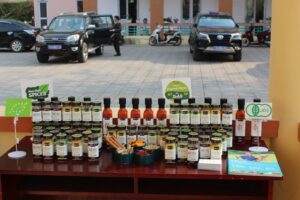I. New Regulations in 2024
In 2024, the European Union implemented stringent changes to its pesticide regulations to enhance human and environmental safety. The EU has banned certain harmful pesticides including carbendazim, linuron, propiconazole, thiamethoxam, clothianidin, and imidacloprid. Furthermore, the Maximum Residue Level (MRL) for pesticides in imported goods is set to a strict 0.01 mg/kg, ensuring no detectable pesticide residues. The EU also introduced a multi-annual control program running from 2025 to 2027, focusing on compliance and consumer exposure assessments. This includes rigorous testing of key food samples to monitor pesticide residue levels. Furthermore, they provide an accessible pesticide database that allows users to track active substances, MRLs, and emergency authorizations, ensuring transparency and consumer protection.

On 16/01/2024, the European Union announced amendments to Regulation (EU) 2019/1793: Special import conditions for certain foods and animal feeds from certain third countries due to the risk of contamination by mycotoxins, including: Aflatoxin, pesticide residues, dioxin, Pentachlorophenol, microbial contamination, Sudan dyes, Rhodamine B,…
Promulgating Regulation (EU)2024/331 amending and supplementing Annexes II and V of (EC)396/2005: EU issues regulation (EU)2024/331 on changing the maximum limit of oxamyl pesticides in agricultural and food products, effective from 11/05/2024
Accordingly, the EU will apply the lowest Oxamyl residue level on agricultural products at 0.001 mg/kg, a significant reduction compared to current regulations.
EU promulgation (EU) 2024/1342 applies changes to residue levels for Deltamethrin, Metalaxyl, Thiabendazole and Trifloxystrobin on certain foods: For Metalaxyl: increase MRL for black pepper and white pepper from 0.05 to 2 ppm.
Vietnam in May, 2024 received 10 warnings from France, Spain, Germany, Italy, Greece and the Netherlands. There were quite a few banned active ingredients such as hexaconazole, methamidophos, acephate, chlorpyrifo, permethrin, chlorfenapyr, propiconazole detected in fresh chili.
Commission Implementing Regulation (EU) 2024/1662 of 11 June 2024 amending Implementing Regulation (EU) 2019/1793: Capsicum peppers (except sweet peppers) have been subject to increased levels of official control due to the risk of pesticide residue contamination since January 2013. Therefore, peppers in Annex I of the Implementing Regulation (EU) 2019/1793 will move to Annex II of that Regulation, with a physical inspection frequency of 50% of consignments entering the EU.
COMMISSION REGULATION (EU) 2024/1987 of 30 July 2024 amending Regulation (EU) 2023/915 as regards maximum levels of nickel in certain foodstuffs: for Root and tuber vegetables and bulb vegetables: Maximum level (mg/kg) = 0.9
COMMISSION REGULATION (EU) 2024/2633 of 8 October 2024 amending Annex II to Regulation (EC) No 396/2005 of the European Parliament and of the Council as regards maximum residue levels for azoxystrobin, famoxadone, flutriafol, mandipropamid and mefentrifluconazole in or on certain products.
Commission Regulation (EU) 2024/2619 of 8 October 2024 amending Annexes II and III to Regulation (EC) No 396/2005 of the European Parliament and of the Council as regards maximum residue levels for fosetyl, potassium phosphonates and disodium phosphonate in or on certain products.
Commission Regulation (EU) 2024/2612 of 7 October 2024 amending Annexes II, III and IV to Regulation (EC) No 396/2005 of the European Parliament and of the Council as regards maximum residue levels for chitosan, clopyralid, difenoconazole, fat distillation residues, flonicamid, hydrolysed proteins, and lavandulyl senecioate in or on certain products.
II. DACE’s solutions
- Organic Farming: Utilizing farming methods that do not use chemical pesticides, instead focusing on maintaining soil health and biodiversity.
- Farmers Supervising: At DACE, we have implemented stringent solutions and control measures through our ICS system to manage, monitor, and ensure quality from our raw material areas. Each farmer is responsible for cross-checking the surrounding households. If any violations are found, the offending farmer will be removed from the organic list.
(Sources: https://eur-lex.europa.eu/eli/reg_impl/2024/989/oj
https://food.ec.europa.eu/plants/pesticides/eu-pesticides-database_en)
(Sources: https://eur-lex.europa.eu/eli/reg_impl/2024/286)
(Sources: https://eur-lex.europa.eu/eli/reg/2024/331/oj)
(Sources: https://eur-lex.europa.eu/legal-content/EN/TXT/?uri=CELEX%3A32024R1342)
(Sources: https://eur-lex.europa.eu/eli/reg_impl/2024/1662/oj)
(Sources: https://eur-lex.europa.eu/legal-content/EN/ALL/?uri=CELEX:32024R1987)
(Sources: https://www.chemradar.com/news/detail/e1htufbpgni8)


